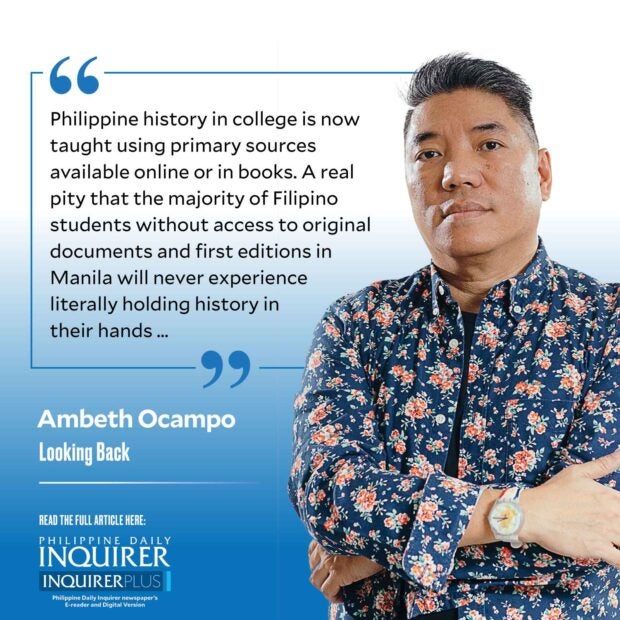History at your fingertips
Preparing to teach face to face, the first time in the Ateneo since the pandemic lockdown, I look back on the last semester I taught at the University of Michigan at Ann Arbor. I taught an undergraduate history course “Under Two Empires: The Philippines under Spain and the United States” and a graduate seminar on Rizal taught from primary sources. While one should not compare lemons with kalamansi, I could not help but envy my US-based students, particularly the Fil-Ams, who had easy access to primary sources for their term papers. In the Ann Arbor campus alone, there were at least five repositories of primary source Philippine materials waiting to be explored: the Bentley Historical Library, the Gerald Ford Presidential Library, the University of Michigan Hatcher Graduate Library Special Collections, the University of Michigan Clements Library, and the bodega of the University of Michigan Museum of Anthropology that preserves hundreds of archaeological and ethnographic artifacts collected from the Philippines mainly from the late 19th to the early 20th centuries.
While researching in the Bentley and the Clements, I saw some of the undergrads hard at work sifting through boxes of old paper and transcribing manuscripts they found relevant. Those who browsed through photographs had a bigger challenge because they had to make sense of the images and write out their impressions and conclusions. I kicked myself for not having brought the class to these repositories earlier. At the Clements, I coordinated with an archivist who gave an animated introduction to the library and its collections. As we walked through the very formal reading room and looked at small curated exhibits of documents under glass, the archivist said that my class was one of the few who have actually ventured inside the Rare Book and Manuscript Library, most of them doing much of their research in the university library. During final exam week, the Clements made an exception and opened its reading room for students who needed a quiet place to review.
Almost all Filipino scholars head to the Bentley Historical Library because that is where one will find papers relative to the History of Michigan, particularly the “Michigan Men” who went to the Philippines. Among them: Dean C. Worcester, Frank Murphy, Joseph Ralston Hayden, and George Malcolm, and many more. Malcolm’s name is on Malcolm Hall at the University of the Philippines College of Law. Murphy is a Quezon City district that used to be associated with Camp Murphy, now Camp Aguinaldo. I spent many hours at the Bentley, first in 2000 and again in 2023, knowing that I cannot humanly cover all the Filipiniana they have in their climate-controlled storage. My students went through collections here, too. However, it was at the Clements that I had not known about till 2023 when I was drawn to a catalog entry on love letters from Douglas MacArthur to a woman in Manila. I wrote a column about that earlier this year (“MacArthur in love,” 2/22/23).
What really got me excited was that the Clements had a copy of the 1525 “De Moluccis Insulis” by Maximilianus Transylvanus that is technically the first book to make reference to the Philippines as it was drawn from interviews of the survivors of the Magellan expedition. The National Library of the Philippines has a beat-up copy in its vault; the Clements copy was pristine, like it had just come from the printing press. This was one of the books that I requested to be brought out for show-and-tell with my students. For conservation reasons, not everyone in class was allowed to leaf through it but they could, individually, make an appointment to use it. I requested one of the photograph collections that documented what Manila was like when the Stars and Stripes flew over Fort San Antonio Abad after a mock battle that led to the surrender of Spanish Manila on Aug. 13, 1898. They also read a handwritten letter from a soldier to family in the US describing what it was like to be deployed in the Philippine-American War.
Philippine history in college is now taught using primary sources available online or in books. A real pity that the majority of Filipino students without access to original documents and first editions in Manila will never experience literally holding history in their hands, unlike the Michigan Fil-Ams who have these literally at their fingertips.
Comments are welcome at [email protected]
Disclaimer: The comments uploaded on this site do not necessarily represent or reflect the views of management and owner of Cebudailynews. We reserve the right to exclude comments that we deem to be inconsistent with our editorial standards.

